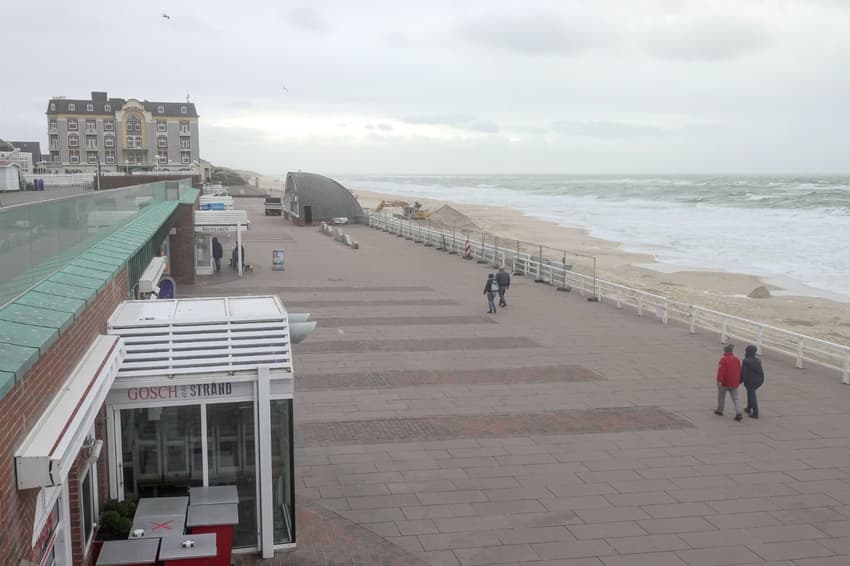This is where (and how) Germans plan to holiday in 2021

Despite the coronavirus pandemic, travel is still on the minds of many Germans. A comprehensive survey looks at where they're eager to go in the coming year.
Hometogo, the search engine for holiday homes and flats, matched 16 million search queries with an externally commissioned survey to find out where Germans will be headed in 2021.
The result: on the whole, many German are planning to stay home, but as usual many are brimming with Wanderlust as they plan out their next holidays.
A total of 44.4 percent of search queries from the search period January 1st to October 27th 2020 were for destinations in Germany. The most popular holiday searches were for the Baltic Sea, North Sea and Sylt.
READ ALSO: North Sea or Baltic Sea? How to choose between Germany's two coasts
Destinations abroad will lose out in 2021: Croatia came in second place with only 11.05 per cent of search queries - last year it stood at 14.69 percent.
Italy is in third place with 7.79 per cent compared to 11.58 per cent in the previous year.
As the survey commissioned by Hometogo shows, the Germans' desire to travel still remains: 70 percent of those surveyed intend to travel in the next 12 months. Moreover, 61 percent would rather book a holiday home in 2021, while 31 percent would prefer a hotel.
According to the survey results, only three percent of those questioned would consider spending the night in a camper van - somewhat surprising after the camping boom in 2020. A full 71 percent, however, plan to travel by car next year.
As far as the type of destinations are concerned, most Germans are drawn to a beach holiday next year (63 percent), but national parks and destinations in the countryside trail only slightly behind (60 percent).
City breaks were only slightly behind, with 52 percent of those surveyed saying that they would like to venture into a bigger city on their holidays.
For the month of November, Germany has imposed a hospitality ban for hotels, pensions and guests homes for holiday travellers as part of a partial lockdown. It is not yet clear if the restriction will be extended after November ends.
READ ALSO: Is Germany set to tighten shutdown measures?
Vocabulary
travel destination - (das) Reisezeil
Baltic Sea - (die) Ostsee
search queries - (die) Suchanfragen
restrictions - (die) Einschränkungen
We're aiming to help our readers improve their German by translating vocabulary from some of our news stories. Did you find this article useful? Let us know.
Comments
See Also
Hometogo, the search engine for holiday homes and flats, matched 16 million search queries with an externally commissioned survey to find out where Germans will be headed in 2021.
The result: on the whole, many German are planning to stay home, but as usual many are brimming with Wanderlust as they plan out their next holidays.
A total of 44.4 percent of search queries from the search period January 1st to October 27th 2020 were for destinations in Germany. The most popular holiday searches were for the Baltic Sea, North Sea and Sylt.
READ ALSO: North Sea or Baltic Sea? How to choose between Germany's two coasts
Destinations abroad will lose out in 2021: Croatia came in second place with only 11.05 per cent of search queries - last year it stood at 14.69 percent.
Italy is in third place with 7.79 per cent compared to 11.58 per cent in the previous year.
As the survey commissioned by Hometogo shows, the Germans' desire to travel still remains: 70 percent of those surveyed intend to travel in the next 12 months. Moreover, 61 percent would rather book a holiday home in 2021, while 31 percent would prefer a hotel.
According to the survey results, only three percent of those questioned would consider spending the night in a camper van - somewhat surprising after the camping boom in 2020. A full 71 percent, however, plan to travel by car next year.
As far as the type of destinations are concerned, most Germans are drawn to a beach holiday next year (63 percent), but national parks and destinations in the countryside trail only slightly behind (60 percent).
City breaks were only slightly behind, with 52 percent of those surveyed saying that they would like to venture into a bigger city on their holidays.
For the month of November, Germany has imposed a hospitality ban for hotels, pensions and guests homes for holiday travellers as part of a partial lockdown. It is not yet clear if the restriction will be extended after November ends.
READ ALSO: Is Germany set to tighten shutdown measures?
Vocabulary
travel destination - (das) Reisezeil
Baltic Sea - (die) Ostsee
search queries - (die) Suchanfragen
restrictions - (die) Einschränkungen
We're aiming to help our readers improve their German by translating vocabulary from some of our news stories. Did you find this article useful? Let us know.
Join the conversation in our comments section below. Share your own views and experience and if you have a question or suggestion for our journalists then email us at [email protected].
Please keep comments civil, constructive and on topic – and make sure to read our terms of use before getting involved.
Please log in here to leave a comment.